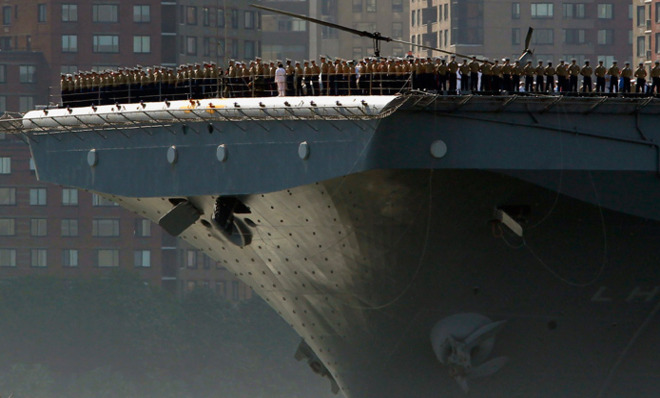How Pentagon budget cuts could make America safer
When it comes to power, often less is more


A free daily email with the biggest news stories of the day – and the best features from TheWeek.com
You are now subscribed
Your newsletter sign-up was successful
Yesterday, news broke that the Pentagon is planning some budget cuts, the scope of which are being wildly exaggerated. The comparison dozens of media outlets have been using is that the Pentagon is going to shrink the Army to a pre-WWII level. As Peter Weber points out, this is laughable. Make no mistake: This is a proposal for a minor trim which will leave the U.S. military by far the most powerful in the world, not return it to the threadbare levels of interwar isolationism. It even keeps the pointless, already-obsolete, staggeringly expensive F-35 boondoggle.
But there are some real cuts here and they present the opportunity to really think through what we want from our military forces. There are at least two reasons to think that a smaller military budget might make America safer, not weaker.
The first reason is that it might force the armed forces to prioritize — to think beyond pork barreling to whether particular weapons or platforms make sense anymore. Take carriers, for instance; they are highly vulnerable and carry up to 6000 people apiece — just one being lost with all hands would be more U.S. deaths than the entire Iraq War. And the military knows this. About 12 years ago they ran a simulation called the Millennium Challenge 2002, and put a retired Marine officer in charge of the opposing "Red" team. Using clever tactics to get around the technological superiority of "Blue" (representing the U.S.), he inflicted stupendous casualties:
The Week
Escape your echo chamber. Get the facts behind the news, plus analysis from multiple perspectives.

Sign up for The Week's Free Newsletters
From our morning news briefing to a weekly Good News Newsletter, get the best of The Week delivered directly to your inbox.
From our morning news briefing to a weekly Good News Newsletter, get the best of The Week delivered directly to your inbox.
In that war game, the Blue Team navy, representing the United States, lost 16 major warships — an aircraft carrier, cruisers, and amphibious vessels — when they were sunk to the bottom of the Persian Gulf in an attack that included swarming tactics by enemy speedboats. [The New York Times]
It has been such a long time since the U.S. had to face an actually threatening enemy that we have become blind to possibilities like that — something like 20,000 casualties in a matter of minutes. At Foreign Policy, John Arquila argues that a more effective Navy would "distribute its capabilities across many hundreds of small craft armed with very smart weapons" and that because "of their stealth and multiple uses, submarines would stay while carriers would go." But this is not to pick on carriers, which might still be useful in some contexts. (Heck, just plug them into the national power grid, if nothing else.) The point is that a bit of budget stringency could force the Pentagon to think about which things are actually useful in a modern technological context rather than what is biggest and shiniest.
The second reason these cuts could make us safer is reducing the risk of blowback. The greatest national security threat to this country right now is not a great power war. China could probably knock out the Seventh Fleet in one go, but there's no reason for them to do it. (Who would they export to?) The big problem these days is international terrorism, and one of the biggest things stoking international terrorism is U.S. overreach itself.
Understand, that is not to say that American citizens deserve terrorism, or that the United States is the sole cause of terrorism worldwide. It's just that when, say, the U.S. invades a country on false pretenses causing the deaths of something like a half-million people, it tends to inspire an enraged desire for vengeance. To stop terrorism, it helps to stop behaving like Osama bin Laden's caricature of America, and a smaller military will make is somewhat more difficult to start counterproductive wars of aggression.
Let's look at Libya, as an example. When a cadre of national security advisors wanted to send the military into Libya, then-Defense Secretary Robert Gates told them it wasn't just a bad idea, but almost inoperable given American overextension. In hindsight, does anyone think it would have been a good idea to have sent boots on the ground in Libya? Did failing to do so make us weaker? No, restraint probably made us stronger. The same could be said for Syria.
A free daily email with the biggest news stories of the day – and the best features from TheWeek.com
Now, the military cuts Hagel outlined won't make a decisive difference. There are larger forces at work far more important than a small change in the budget. The main thing I want to emphasize, though, is that the safety of America is dependent on more than the size of our military budget, or how aggressively we use force. It also depends on how we use that force, and when it comes to the military, often less is more.
Ryan Cooper is a national correspondent at TheWeek.com. His work has appeared in the Washington Monthly, The New Republic, and the Washington Post.
